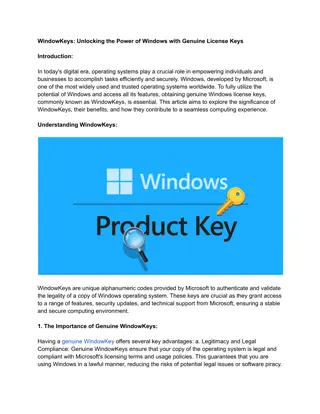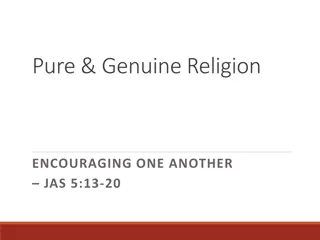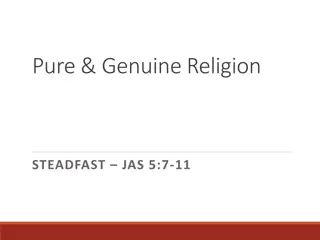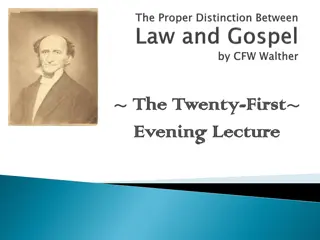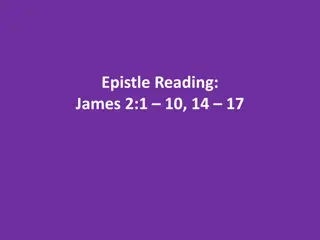The Epistle of James: Exhortation to Genuine Faith and Love
The Epistle of James addresses the need for genuine, working faith among Jewish Christians, emphasizing the importance of loving one another and avoiding divisions based on wealth, pride, and prejudice. James encourages believers to persevere through trials, which can produce character and deepen their faith. The epistle also warns against showing partiality and mistreating the poor, emphasizing the value of true faith and humility.
Download Presentation

Please find below an Image/Link to download the presentation.
The content on the website is provided AS IS for your information and personal use only. It may not be sold, licensed, or shared on other websites without obtaining consent from the author.If you encounter any issues during the download, it is possible that the publisher has removed the file from their server.
You are allowed to download the files provided on this website for personal or commercial use, subject to the condition that they are used lawfully. All files are the property of their respective owners.
The content on the website is provided AS IS for your information and personal use only. It may not be sold, licensed, or shared on other websites without obtaining consent from the author.
E N D
Presentation Transcript
The Epistle of James Love Each Other
The Epistle of James Love Each Other We have observed that the epistle of James was written to encourage Jewish Christians as they dispersed from Jerusalem and returned home. Their faith would be tested by various trials that they would fall into through no fault of their own. However, as we get into the heart of the epistle, it is evident that James is aware of some major character problems these Christians needed to concede to and repent of. They were not to have a mere conviction of faith, but a genuine working faith. They were not a loving spiritual family; they were divided by wealth, pride, and prejudice, envy, and strife, and hypocritical faith (2:1-13; 3:14-16; 4:1- 5). The wealthy trusted in their riches, and mistreated their employees (5:1-6). This test of their faith would produce character, also, if they would repent. James 1:2 NKJV 2 My brethren, count it all joy when you fall into various trials, 3 knowing that the testing of your faith produces patience.
The Epistle of James Love Each Other We have observed that the epistle of James was written to encourage Jewish Christians as they dispersed from Jerusalem and returned home. Their faith would be tested by various trials that they would fall into through no fault of their own. However, as we get into the heart of the epistle, it is evident that James is aware of some major character problems these Christians needed to concede to and repent of. They were not to have a mere conviction of faith, but a genuine working faith. They were not a loving spiritual family; they were divided by wealth, pride, and prejudice, envy, and strife, and hypocritical faith (2:1-13; 3:14-16; 4:1- 5). The wealthy trusted in their riches, and mistreated their employees (5:1-6). This test of their faith would produce character, also, if they would repent. James 2:1-7 NKJV 1 My brethren, do not hold the faith of our Lord Jesus Christ, the Lord of glory, with partiality. 2 For if there should come into your assembly a man with gold rings, in fine apparel, and there should also come in a poor man in filthy clothes, 3 and you pay attention to the one wearing the fine clothes and say to him, "You sit here in a good place," and say to the poor man, "You stand there," or, "Sit here at my footstool," 4 have you not shown partiality among yourselves, and become judges with evil thoughts? 5 Listen, my beloved brethren: Has God not chosen the poor of this world to be rich in faith and heirs of the kingdom which He promised to those who love Him? 6 But you have dishonored the poor man. Do not the rich oppress you and drag you into the courts? 7 Do they not blaspheme that noble name by which you are called?
The Epistle of James Love Each Other We have observed that the epistle of James was written to encourage Jewish Christians as they dispersed from Jerusalem and returned home. Their faith would be tested by various trials that they would fall into through no fault of their own. However, as we get into the heart of the epistle, it is evident that James is aware of some major character problems these Christians needed to concede to and repent of. They were not to have a mere conviction of faith, but a genuine working faith. They were not a loving spiritual family; they were divided by wealth, pride, and prejudice, envy, and strife, and hypocritical faith (2:1-13; 3:14-16; 4:1- 5). The wealthy trusted in their riches, and mistreated their employees (5:1-6). This test of their faith would produce character, also, if they would repent. James 2:1-7 NKJV 1 My brethren, do not hold the faith of our Lord Jesus Christ, the Lord of glory, with partiality. 2 For if there should come into your assembly a man with gold rings, in fine apparel, and there should also come in a poor man in filthy clothes, 3 and you pay attention to the one wearing the fine clothes and say to him, "You sit here in a good place," and say to the poor man, "You stand there," or, "Sit here at my footstool," 4 have you not shown partiality among yourselves, and become judges with evil thoughts? 5 Listen, my beloved brethren: Has God not chosen the poor of this world to be rich in faith and heirs of the kingdom which He promised to those who love Him? 6 But you have dishonored the poor man. Do not the rich oppress you and drag you into the courts? 7 Do they not blaspheme that noble name by which you are called?
The Epistle of James Love Each Other We have observed that the epistle of James was written to encourage Jewish Christians as they dispersed from Jerusalem and returned home. Their faith would be tested by various trials that they would fall into through no fault of their own. However, as we get into the heart of the epistle, it is evident that James is aware of some major character problems these Christians needed to concede to and repent of. They were not to have a mere conviction of faith, but a genuine working faith. They were not a loving spiritual family; they were divided by wealth, pride, and prejudice, envy, and strife, and hypocritical faith (2:1-13; 3:14-16; 4:1- 5). The wealthy trusted in their riches, and mistreated their employees (5:1-6). This test of their faith would produce character, also, if they would repent. James 2:1-7 NKJV 1 My brethren, do not hold the faith of our Lord Jesus Christ, the Lord of glory, with partiality. 2 For if there should come into your assembly a man with gold rings, in fine apparel, and there should also come in a poor man in filthy clothes, 3 and you pay attention to the one wearing the fine clothes and say to him, "You sit here in a good place," and say to the poor man, "You stand there," or, "Sit here at my footstool," 4 have you not shown partiality among yourselves, and become judges with evil thoughts? 5 Listen, my beloved brethren: Has God not chosen the poor of this world to be rich in faith and heirs of the kingdom which He promised to those who love Him? 6 But you have dishonored the poor man. Do not the rich oppress you and drag you into the courts? 7 Do they not blaspheme that noble name by which you are called?
The Epistle of James Love Each Other We have observed that the epistle of James was written to encourage Jewish Christians as they dispersed from Jerusalem and returned home. Their faith would be tested by various trials that they would fall into through no fault of their own. However, as we get into the heart of the epistle, it is evident that James is aware of some major character problems these Christians needed to concede to and repent of. They were not to have a mere conviction of faith, but a genuine working faith. They were not a loving spiritual family; they were divided by wealth, pride, and prejudice, envy, and strife, and hypocritical faith (2:1-13; 3:14-16; 4:1- 5). The wealthy trusted in their riches, and mistreated their employees (5:1-6). This test of their faith would produce character, also, if they would repent. James 2:1-7 NKJV 1 My brethren, do not hold the faith of our Lord Jesus Christ, the Lord of glory, with partiality. 2 For if there should come into your assembly a man with gold rings, in fine apparel, and there should also come in a poor man in filthy clothes, 3 and you pay attention to the one wearing the fine clothes and say to him, "You sit here in a good place," and say to the poor man, "You stand there," or, "Sit here at my footstool," 4 have you not shown partiality among yourselves, and become judges with evil thoughts? 5 Listen, my beloved brethren: Has God not chosen the poor of this world to be rich in faith and heirs of the kingdom which He promised to those who love Him? 6 But you have dishonored the poor man. Do not the rich oppress you and drag you into the courts? 7 Do they not blaspheme that noble name by which you are called?
The Epistle of James Love Each Other We have observed that the epistle of James was written to encourage Jewish Christians as they dispersed from Jerusalem and returned home. Their faith would be tested by various trials that they would fall into through no fault of their own. However, as we get into the heart of the epistle, it is evident that James is aware of some major character problems these Christians needed to concede to and repent of. They were not to have a mere conviction of faith, but a genuine working faith. They were not a loving spiritual family; they were divided by wealth, pride, and prejudice, envy, and strife, and hypocritical faith (2:1-13; 3:14-16; 4:1- 5). The wealthy trusted in their riches, and mistreated their employees (5:1-6). This test of their faith would produce character, also, if they would repent. James 2:1-7 NKJV 1 My brethren, do not hold the faith of our Lord Jesus Christ, the Lord of glory, with partiality. 2 For if there should come into your assembly a man with gold rings, in fine apparel, and there should also come in a poor man in filthy clothes, 3 and you pay attention to the one wearing the fine clothes and say to him, "You sit here in a good place," and say to the poor man, "You stand there," or, "Sit here at my footstool," 4 have you not shown partiality among yourselves, and become judges with evil thoughts? 5 Listen, my beloved brethren: Has God not chosen the poor of this world to be rich in faith and heirs of the kingdom which He promised to those who love Him? 6 But you have dishonored the poor man. Do not the rich oppress you and drag you into the courts? 7 Do they not blaspheme that noble name by which you are called?
The Epistle of James Love Each Other We have observed that the epistle of James was written to encourage Jewish Christians as they dispersed from Jerusalem and returned home. Their faith would be tested by various trials that they would fall into through no fault of their own. However, as we get into the heart of the epistle, it is evident that James is aware of some major character problems these Christians needed to concede to and repent of. They were not to have a mere conviction of faith, but a genuine working faith. They were not a loving spiritual family; they were divided by wealth, pride, and prejudice, envy, and strife, and hypocritical faith (2:1-13; 3:14-16; 4:1- 5). The wealthy trusted in their riches, and mistreated their employees (5:1-6). This test of their faith would produce character, also, if they would repent. James 2:1-7 NKJV 1 My brethren, do not hold the faith of our Lord Jesus Christ, the Lord of glory, with partiality. 2 For if there should come into your assembly a man with gold rings, in fine apparel, and there should also come in a poor man in filthy clothes, 3 and you pay attention to the one wearing the fine clothes and say to him, "You sit here in a good place," and say to the poor man, "You stand there," or, "Sit here at my footstool," 4 have you not shown partiality among yourselves, and become judges with evil thoughts? 5 Listen, my beloved brethren: Has God not chosen the poor of this world to be rich in faith and heirs of the kingdom which He promised to those who love Him? 6 But you have dishonored the poor man. Do not the rich oppress you and drag you into the courts? 7 Do they not blaspheme that noble name by which you are called?
The Epistle of James Love Each Other We have observed that the epistle of James was written to encourage Jewish Christians as they dispersed from Jerusalem and returned home. Their faith would be tested by various trials that they would fall into through no fault of their own. However, as we get into the heart of the epistle, it is evident that James is aware of some major character problems these Christians needed to concede to and repent of. They were not to have a mere conviction of faith, but a genuine working faith. They were not a loving spiritual family; they were divided by wealth, pride, and prejudice, envy, and strife, and hypocritical faith (2:1-13; 3:14-16; 4:1- 5). The wealthy trusted in their riches, and mistreated their employees (5:1-6). This test of their faith would produce character, also, if they would repent. James 2:1-7 NKJV 1 My brethren, do not hold the faith of our Lord Jesus Christ, the Lord of glory, with partiality. 2 For if there should come into your assembly a man with gold rings, in fine apparel, and there should also come in a poor man in filthy clothes, 3 and you pay attention to the one wearing the fine clothes and say to him, "You sit here in a good place," and say to the poor man, "You stand there," or, "Sit here at my footstool," 4 have you not shown partiality among yourselves, and become judges with evil thoughts? 5 Listen, my beloved brethren: Has God not chosen the poor of this world to be rich in faith and heirs of the kingdom which He promised to those who love Him? 6 But you have dishonored the poor man. Do not the rich oppress you and drag you into the courts? 7 Do they not blaspheme that noble name by which you are called?
The Epistle of James Love Each Other We have observed that the epistle of James was written to encourage Jewish Christians as they dispersed from Jerusalem and returned home. Their faith would be tested by various trials that they would fall into through no fault of their own. However, as we get into the heart of the epistle, it is evident that James is aware of some major character problems these Christians needed to concede to and repent of. They were not to have a mere conviction of faith, but a genuine working faith. They were not a loving spiritual family; they were divided by wealth, pride, and prejudice, envy, and strife, and hypocritical faith (2:1-13; 3:14-16; 4:1- 5). The wealthy trusted in their riches, and mistreated their employees (5:1-6). This test of their faith would produce character, also, if they would repent. James 2:1-7 NKJV 1 My brethren, do not hold the faith of our Lord Jesus Christ, the Lord of glory, with partiality. 2 For if there should come into your assembly a man with gold rings, in fine apparel, and there should also come in a poor man in filthy clothes, 3 and you pay attention to the one wearing the fine clothes and say to him, "You sit here in a good place," and say to the poor man, "You stand there," or, "Sit here at my footstool," 4 have you not shown partiality among yourselves, and become judges with evil thoughts? 5 Listen, my beloved brethren: Has God not chosen the poor of this world to be rich in faith and heirs of the kingdom which He promised to those who love Him? 6 But you have dishonored the poor man. Do not the rich oppress you and drag you into the courts? 7 Do they not blaspheme that noble name by which you are called?
The Epistle of James Love Each Other James 2:8-13 NKJV 8 If you really fulfill the royal law according to the Scripture, "You shall love your neighbor as yourself," you do well; 9 but if you show partiality, you commit sin, and are convicted by the law as transgressors. 10 For whoever shall keep the whole law, and yet stumble in one point, he is guilty of all. 11 For He who said, "Do not commit adultery," also said, "Do not murder." Now if you do not commit adultery, but you do murder, you have become a transgressor of the law. 12 So speak and so do as those who will be judged by the law of liberty. 13 For judgment is without mercy to the one who has shown no mercy. Mercy triumphs over judgment.
The Epistle of James Love Each Other James 2:8-13 NKJV 8 If you really fulfill the royal law according to the Scripture, "You shall love your neighbor as yourself," you do well; 9 but if you show partiality, you commit sin, and are convicted by the law as transgressors. 10 For whoever shall keep the whole law, and yet stumble in one point, he is guilty of all. 11 For He who said, "Do not commit adultery," also said, "Do not murder." Now if you do not commit adultery, but you do murder, you have become a transgressor of the law. 12 So speak and so do as those who will be judged by the law of liberty. 13 For judgment is without mercy to the one who has shown no mercy. Mercy triumphs over judgment.
The Epistle of James Love Each Other James 2:8-13 NKJV 8 If you really fulfill the royal law according to the Scripture, "You shall love your neighbor as yourself," you do well; 9 but if you show partiality, you commit sin, and are convicted by the law as transgressors. 10 For whoever shall keep the whole law, and yet stumble in one point, he is guilty of all. 11 For He who said, "Do not commit adultery," also said, "Do not murder." Now if you do not commit adultery, but you do murder, you have become a transgressor of the law. 12 So speak and so do as those who will be judged by the law of liberty. 13 For judgment is without mercy to the one who has shown no mercy. Mercy triumphs over judgment. Apparently, those guilty of showing partiality were justifying their actions based upon the royal law (Lev. 19:18b; cf., Matt. 19:16-19; 22:36-40; Mark 12:28-31). However, their justification did not hold up, because they were not really / actually fulfilling the royal law toward the poor.
The Epistle of James Love Each Other James 2:8-13 NKJV 8 If you really fulfill the royal law according to the Scripture, "You shall love your neighbor as yourself," you do well; 9 but if you show partiality, you commit sin, and are convicted by the law as transgressors. 10 For whoever shall keep the whole law, and yet stumble in one point, he is guilty of all. 11 For He who said, "Do not commit adultery," also said, "Do not murder." Now if you do not commit adultery, but you do murder, you have become a transgressor of the law. 12 So speak and so do as those who will be judged by the law of liberty. 13 For judgment is without mercy to the one who has shown no mercy. Mercy triumphs over judgment. Apparently, those guilty of showing partiality were justifying their actions based upon the royal law (Lev. 19:18b; cf., Matt. 19:16-19; 22:36-40; Mark 12:28-31). However, their justification did not hold up, because they were not really / actually fulfilling the royal law toward the poor. The Mosaic Law also taught, you shall not show partiality, literally, regard faces. (Deut. 16:19; Lev. 19:13).
The Epistle of James Love Each Other James 2:8-13 NKJV 8 If you really fulfill the royal law according to the Scripture, "You shall love your neighbor as yourself," you do well; 9 but if you show partiality, you commit sin, and are convicted by the law as transgressors. 10 For whoever shall keep the whole law, and yet stumble in one point, he is guilty of all. 11 For He who said, "Do not commit adultery," also said, "Do not murder." Now if you do not commit adultery, but you do murder, you have become a transgressor of the law. 12 So speak and so do as those who will be judged by the law of liberty. 13 For judgment is without mercy to the one who has shown no mercy. Mercy triumphs over judgment. Apparently, those guilty of showing partiality were justifying their actions based upon the royal law (Lev. 19:18b; cf., Matt. 19:16-19; 22:36-40; Mark 12:28-31). However, their justification did not hold up, because they were not really / actually fulfilling the royal law toward the poor. The Mosaic Law also taught, you shall not show partiality, literally, regard faces. (Deut. 16:19; Lev. 19:13).
The Epistle of James Love Each Other James 2:8-13 NKJV 8 If you really fulfill the royal law according to the Scripture, "You shall love your neighbor as yourself," you do well; 9 but if you show partiality, you commit sin, and are convicted by the law as transgressors. 10 For whoever shall keep the whole law, and yet stumble in one point, he is guilty of all. 11 For He who said, "Do not commit adultery," also said, "Do not murder." Now if you do not commit adultery, but you do murder, you have become a transgressor of the law. 12 So speak and so do as those who will be judged by the law of liberty. 13 For judgment is without mercy to the one who has shown no mercy. Mercy triumphs over judgment. Apparently, those guilty of showing partiality were justifying their actions based upon the royal law (Lev. 19:18b; cf., Matt. 19:16-19; 22:36-40; Mark 12:28-31). However, their justification did not hold up, because they were not really / actually fulfilling the royal law toward the poor. The Mosaic Law also taught, you shall not show partiality, literally, regard faces. (Deut. 16:19; Lev. 19:13). (cf. Ex. 20:13,14; cf. Matt. 19:18-19)
The Epistle of James Love Each Other James 2:8-13 NKJV 8 If you really fulfill the royal law according to the Scripture, "You shall love your neighbor as yourself," you do well; 9 but if you show partiality, you commit sin, and are convicted by the law as transgressors. 10 For whoever shall keep the whole law, and yet stumble in one point, he is guilty of all. 11 For He who said, "Do not commit adultery," also said, "Do not murder." Now if you do not commit adultery, but you do murder, you have become a transgressor of the law. 12 So speak and so do as those who will be judged by the law of liberty. 13 For judgment is without mercy to the one who has shown no mercy. Mercy triumphs over judgment. Apparently, those guilty of showing partiality were justifying their actions based upon the royal law (Lev. 19:18b; cf., Matt. 19:16-19; 22:36-40; Mark 12:28-31). However, their justification did not hold up, because they were not really / actually fulfilling the royal law toward the poor. The Mosaic Law also taught, you shall not show partiality, literally, regard faces. (Deut. 16:19; Lev. 19:13). (cf. Ex. 20:13,14; cf. Matt. 19:18-19) The context in which mercy is used here, carries the action of pity, or compassion. Compassion for the unfortunate will guard us from showing partiality. Cf., Matt. 25:41-45, Matt. 5:7
The Epistle of James Love Each Other James 2:14-16 NKJV 14 What does it profit, my brethren, if someone says he has faith but does not have works? Can faith save him? 15 If a brother or sister is naked and destitute of daily food, 16 and one of you says to them, "Depart in peace, be warmed and filled," but you do not give them the things which are needed for the body, what does it profit? Apparently, those guilty of showing partiality were justifying their actions based upon the royal law (Lev. 19:18b; cf., Matt. 19:16-19; 22:36-40; Mark 12:28-31). However, their justification did not hold up, because they were not really / actually fulfilling the royal law toward the poor. The Mosaic Law also taught, you shall not show partiality, literally, regard faces. (Deut. 16:19; Lev. 19:13). v. 8 really fulfill the royal law according to the Scripture, "You shall love your neighbor as yourself," do well The context in which mercy is used here, carries the action of pity, or compassion. Compassion for the unfortunate will guard us from showing partiality. Cf., Matt. 25:41-45, Matt. 5:7
The Epistle of James Love Each Other James 5:1-6 NKJV 1 Come now, you rich, weep and howl for your miseries that are coming upon you! 2 Your riches are corrupted, and your garments are moth-eaten. 3 Your gold and silver are corroded, and their corrosion will be a witness against you and will eat your flesh like fire. You have heaped up treasure in the last days. 4 Indeed the wages of the laborers who mowed your fields, which you kept back by fraud, cry out; and the cries of the reapers have reached the ears of the Lord of Sabaoth. 5 You have lived on the earth in pleasure and luxury; you have fattened your hearts as in a day of slaughter. 6 You have condemned, you have murdered the just; he does not resist you. These had failed to: really fulfill the royal law according to the Scripture, "You shall love your neighbor as yourself, (2:8)




